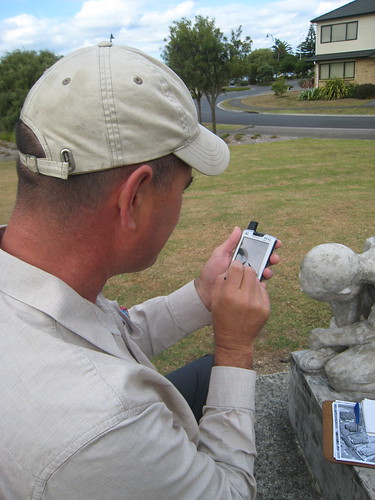 |
|
Mapping an appurtenance point during a GIS field trip on Auckland — photo by Cristel Veefkind (( Veefkind, Cristel. “GIS Field Trip.” Flickr. 14 Mar 2007. Web. 15 Jan 2010. <http://www.flickr.com/photos/zusje/420919459/>. )) |
I was just scanning the news and saw “West Virginia Expands Science, Technology, Engineering, And Mathematics Education with ESRI Software.” I think that this is great and that West Virginia and other states should invest in ramping up their STEM programs. But am I the only one who feels a spasm in my back as we STEM here and STEM there and continue to be feed the line that Science, Technology, Engineering, and Mathematics are THE key to a prosperous future?
We are not in this state of near desperation today, struggling to fund education and other essential services, because people didn’t have enough STEM. This happened because some educated people thought that they could game the economic system for their own selfish and greedy gain, under a “see no evil” administration, and that they could do it without consequences.
What history teaches, is that THERE ARE ALWAYS CONSEQUENCE.
Interestingly, I find that the article, appearing in The American Surveyor, was actually written by ESRI, the GIS software that West Virginia is licensing for its schools, and that the focus of its use and the state offices that are promoting it are all social studies. I guess that “West Virginia Expands Social Studies with…” doesn’t have the right punch — that it wouldn’t make us more “competitive” in the culturally diverse global market place.
Am I the only one who is afraid that the cost for STEM is Art, Music, Drama, and history, culture, geography, and economics?
Thinking and problem-solving are over-rated, if you don’t have a valid context to think and solve within.

Powered by ScribeFire.

Again, really powerful thoughts here. My concerns are similar, but not that we are losing art, music, drama, history, etc. It’s that we are missing the connections between those courses. I hope we get to a point where we are unable to discern between the different disciplines and instead understanding that learning, whether technology is being used or not, needs to cross-discipline and in order for it to be more relevant and realistic.
Agreed. We need to understand the connection between all disciplines in order to understand what it means to be human. Many of the great successes in technofields who have been people who understand how their work fits in the larger picture.